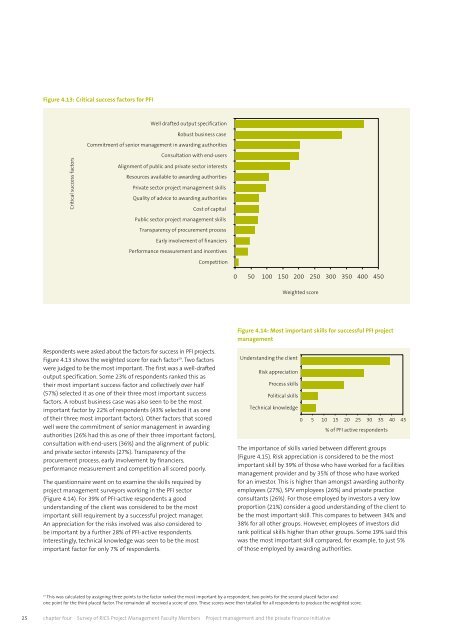Project management and the private finance initiative
Project management and the private finance initiative
Project management and the private finance initiative
You also want an ePaper? Increase the reach of your titles
YUMPU automatically turns print PDFs into web optimized ePapers that Google loves.
Figure 4.13: Critical success factors for PFI<br />
Critical success factors<br />
Well drafted output specification<br />
Robust business case<br />
Commitment of senior <strong>management</strong> in awarding authorities<br />
Consultation with end-users<br />
Alignment of public <strong>and</strong> <strong>private</strong> sector interests<br />
Resources available to awarding authorities<br />
Private sector project <strong>management</strong> skills<br />
Quality of advice to awarding authorities<br />
Public sector project <strong>management</strong> skills<br />
Transparency of procurement process<br />
Early involvement of financiers<br />
Performance measurement <strong>and</strong> incentives<br />
Respondents were asked about <strong>the</strong> factors for success in PFI projects.<br />
Figure 4.13 shows <strong>the</strong> weighted score for each factor 19 . Two factors<br />
were judged to be <strong>the</strong> most important. The first was a well-drafted<br />
output specification. Some 23% of respondents ranked this as<br />
<strong>the</strong>ir most important success factor <strong>and</strong> collectively over half<br />
(57%) selected it as one of <strong>the</strong>ir three most important success<br />
factors. A robust business case was also seen to be <strong>the</strong> most<br />
important factor by 22% of respondents (43% selected it as one<br />
of <strong>the</strong>ir three most important factors). O<strong>the</strong>r factors that scored<br />
well were <strong>the</strong> commitment of senior <strong>management</strong> in awarding<br />
authorities (26% had this as one of <strong>the</strong>ir three important factors),<br />
consultation with end-users (36%) <strong>and</strong> <strong>the</strong> alignment of public<br />
<strong>and</strong> <strong>private</strong> sector interests (27%). Transparency of <strong>the</strong><br />
procurement process, early involvement by financiers,<br />
performance measurement <strong>and</strong> competition all scored poorly.<br />
The questionnaire went on to examine <strong>the</strong> skills required by<br />
project <strong>management</strong> surveyors working in <strong>the</strong> PFI sector<br />
(Figure 4.14). For 39% of PFI-active respondents a good<br />
underst<strong>and</strong>ing of <strong>the</strong> client was considered to be <strong>the</strong> most<br />
important skill requirement by a successful project manager.<br />
An appreciation for <strong>the</strong> risks involved was also considered to<br />
be important by a fur<strong>the</strong>r 28% of PFI-active respondents.<br />
Interestingly, technical knowledge was seen to be <strong>the</strong> most<br />
important factor for only 7% of respondents.<br />
Cost of capital<br />
Competition<br />
0 50 100 150 200 250 300 350 400 450<br />
Weighted score<br />
Figure 4.14: Most important skills for successful PFI project<br />
<strong>management</strong><br />
Underst<strong>and</strong>ing <strong>the</strong> client<br />
Risk appreciation<br />
Process skills<br />
Political skills<br />
Technical knowledge<br />
19 This was calculated by assigning three points to <strong>the</strong> factor ranked <strong>the</strong> most important by a respondent, two points for <strong>the</strong> second placed factor <strong>and</strong><br />
one point for <strong>the</strong> third placed factor. The remainder all received a score of zero. These scores were <strong>the</strong>n totalled for all respondents to produce <strong>the</strong> weighted score.<br />
25 chapter four Survey of RICS <strong>Project</strong> Management Faculty Members <strong>Project</strong> <strong>management</strong> <strong>and</strong> <strong>the</strong> <strong>private</strong> <strong>finance</strong> <strong>initiative</strong><br />
0 5 10 15 20 25 30 35 40 45<br />
% of PFI active respondents<br />
The importance of skills varied between different groups<br />
(Figure 4.15). Risk appreciation is considered to be <strong>the</strong> most<br />
important skill by 39% of those who have worked for a facilities<br />
<strong>management</strong> provider <strong>and</strong> by 35% of those who have worked<br />
for an investor. This is higher than amongst awarding authority<br />
employees (27%), SPV employees (26%) <strong>and</strong> <strong>private</strong> practice<br />
consultants (26%). For those employed by investors a very low<br />
proportion (21%) consider a good underst<strong>and</strong>ing of <strong>the</strong> client to<br />
be <strong>the</strong> most important skill. This compares to between 34% <strong>and</strong><br />
38% for all o<strong>the</strong>r groups. However, employees of investors did<br />
rank political skills higher than o<strong>the</strong>r groups. Some 19% said this<br />
was <strong>the</strong> most important skill compared, for example, to just 5%<br />
of those employed by awarding authorities.

















